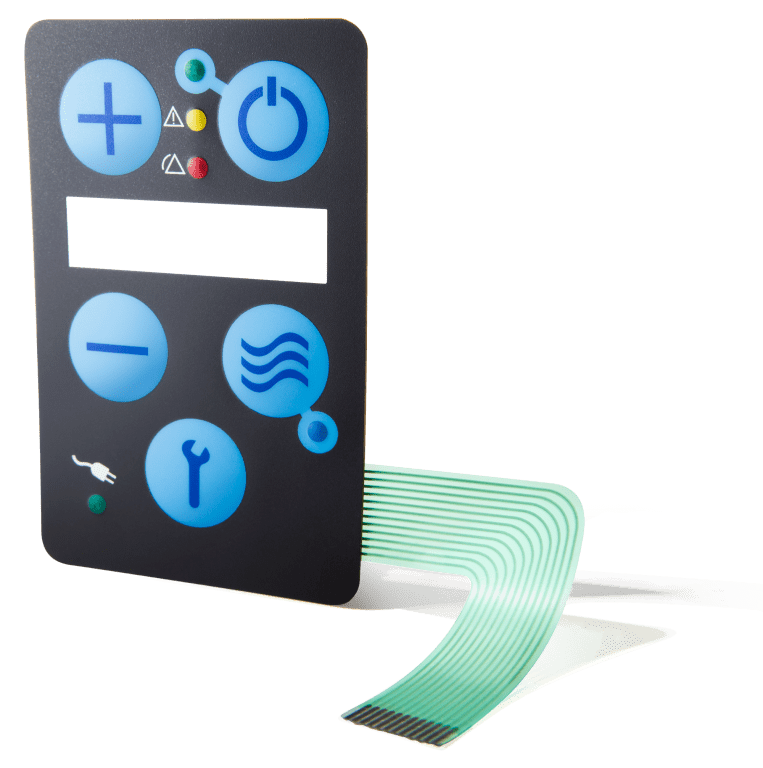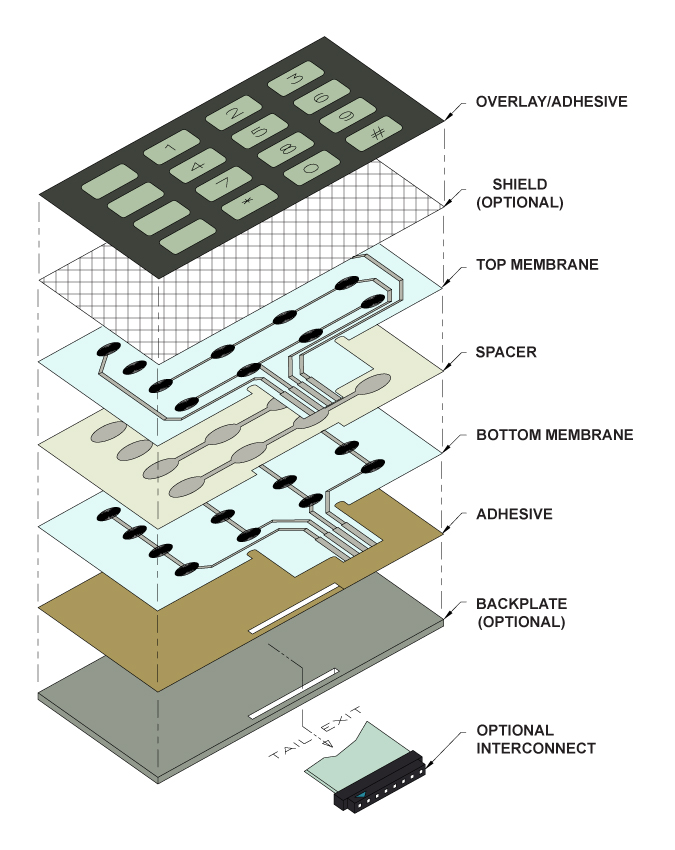How to Choose the Right Membrane Switch for Your Technology Needs
How to Choose the Right Membrane Switch for Your Technology Needs
Blog Article
Why Membrane Changes Are Crucial for Durable Control Equipment
Membrane switches play a critical function in ensuring the durability and reliability of control systems throughout various markets. As we check out the diverse advantages of membrane switches, it ends up being obvious that their importance goes beyond simple performance, affecting user experience and functional efficiency.
Introduction of Membrane Layer Buttons
Membrane switches are versatile and reputable components typically utilized in numerous electronic control systems. These buttons are composed of several layers, including a visuals overlay, a spacer layer, and a printed circuit layer. The visuals overlay supplies both practical and visual layout, while the spacer layer makes certain that the buttons are triggered only when pushed. The printed circuit layer includes conductive traces that complete an electric circuit when the membrane layer is pushed, allowing the device to react to individual inputs.
Membrane switches are commonly preferred in applications calling for a small and light-weight design, making them excellent for portable gadgets, clinical equipment, and industrial machinery. They can be personalized to fulfill details individual requirements and can incorporate numerous functions such as backlighting, tactile feedback, and several shades. Membrane layer switches are immune to dust, wetness, and impurities, making them suitable for atmospheres where toughness is necessary.
Advantages of Durability
In several applications, the durability of membrane layer changes offers substantial benefits that improve their overall performance and dependability. These buttons are made to hold up against severe atmospheres, making them suitable for use popular problems such as high moisture, extreme temperatures, and direct exposure to chemicals. Their durable building assists to stop damages from physical effect, ensuring long-lasting capability and decreasing the demand for regular replacements.
Furthermore, membrane layer switches are resistant to damage, which is essential in applications where frequent interaction happens. This resilience translates to decrease upkeep costs, as organizations profit from decreased downtime and fewer service interruptions. In addition, the encapsulated style of membrane layer changes secures interior parts from dirt and wetness ingress, further adding to their life-span.
One more benefit is their capability to maintain consistent performance over time. With a high tolerance for mechanical stress, these buttons maintain their tactile feedback and electric stability, guaranteeing individual contentment. Eventually, the resilience of membrane layer changes not just improves functional efficiency but additionally fosters confidence in their integrity, making them a favored choice for control systems throughout different fields.
Applications in Numerous Industries
Long lasting control systems utilizing membrane switches locate considerable applications across a variety of industries, each taking advantage of the distinct attributes these switches provide. In the clinical market, membrane layer buttons are vital for tools such as client screens and diagnostic tools, where integrity and simplicity of cleaning are extremely important. Their resistance to dampness and impurities ensures they maintain capability in sterile environments.
The auto market leverages membrane buttons for control panel controls and infotainment systems, where they give smooth, low-profile interfaces that enhance customer experience. These switches are additionally developed to stand up to rough conditions, including direct exposure to extreme temperature levels and vibrations.
In industrial setups, membrane layer buttons are commonly made use of in equipment control panels, using tactile responses and sturdiness essential for high-usage applications. Their ability to stand up to chemicals makes them ideal for manufacturing environments where spills and impurities are frequent.

Consumer electronics, such as kitchen area appliances and remote controls, also make use of membrane switches for their versatility and cost-effectiveness. Generally, the versatility and robust nature of membrane layer switches make them important throughout numerous markets, guaranteeing efficient procedure and durability in control systems.
Design and Visual Charm
While capability is vital, the layout and aesthetic appeal of control systems equipped with membrane switches play a vital role in user involvement and total experience (membrane switch). The aesthetic design of these buttons can considerably influence user assumption and interaction. A properly designed membrane layer switch improves the beauty of the device, making it much more enticing to users and promoting a connection between the user and the item
Membrane changes supply a good deal of adaptability in layout, enabling makers to customize graphics, colors, and structures to align with brand name identification and product appearances. Using lively shades and unique patterns can attract focus, while responsive feedback can strengthen the individual's interaction with the gadget. Additionally, Recommended Reading the capability to integrate LED signs and backlighting into the membrane switch design gives my response both functional and visual benefits, improving presence and usability in various settings.
Enhancing Customer Experience

Additionally, membrane layer buttons can be personalized to incorporate graphical interfaces, enhancing use by presenting information in a clear and intuitive way (membrane switch). This modification can consist of symbols, labels, and color coding that guide customers through complicated performances easily. Furthermore, their flexibility permits for integration in numerous atmospheres, ensuring regular efficiency whether in sites industrial equipment or customer electronics
The resilience of membrane layer buttons also plays an essential function in individual experience. By enduring rough conditions and extended usage, these buttons lower the probability of system failings, therefore advertising reliability and individual self-confidence. Inevitably, the strategic use of membrane layer changes not only raises capability however also dramatically enriches individual interaction with control systems, making them a crucial component in modern-day design.
Final Thought

Report this page